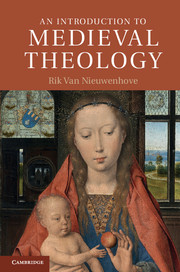Book contents
- Frontmatter
- Contents
- Abbreviations
- Chapter 1 Introduction
- Part I The legacy of the Fathers
- Part II Early medieval theologians
- Part III The eleventh and twelfth centuries
- Part IV The thirteenth century
- Chapter 12 Introduction
- Chapter 13 Thomas Aquinas
- Chapter 14 Bonaventure
- Chapter 15 The Condemnations of 1277
- Chapter 16 John Duns Scotus
- Part V The fourteenth century and beyond
- Bibliography
- Index
- References
Chapter 16 - John Duns Scotus
Published online by Cambridge University Press: 05 June 2012
- Frontmatter
- Contents
- Abbreviations
- Chapter 1 Introduction
- Part I The legacy of the Fathers
- Part II Early medieval theologians
- Part III The eleventh and twelfth centuries
- Part IV The thirteenth century
- Chapter 12 Introduction
- Chapter 13 Thomas Aquinas
- Chapter 14 Bonaventure
- Chapter 15 The Condemnations of 1277
- Chapter 16 John Duns Scotus
- Part V The fourteenth century and beyond
- Bibliography
- Index
- References
Summary
Introduction
John Duns Scotus (c. 1266–1308) is widely regarded as the last major thinker of the golden age of thirteenth-century scholasticism. In many ways, he is a pivotal figure, reflecting both the end of the classic age of scholasticism and inaugurating some of the new trends that were to come to fruition in the thought of his fellow Franciscan, William of Ockham. We know little enough about his life. As his name suggests, he was from Duns, in the south of Scotland. He was ordained in Northampton on March 17, 1291, which allows us to conclude that he was probably born c. 1266. Around 1298–99, while at Oxford, he prepared a first set of lectures on Peter Lombard’s Sentences. This set of lectures is known as the Lectura. Scotus thoroughly revised this work throughout his short life, and the revised version is known as the Ordinatio. Between 1302 and 1303, Scotus lectured in Paris and student notes on Book I, corrected by Scotus himself, have survived as “The Examined Report of the Paris Lectures” (Reportatio Examinata Parisiensis). It is effectively a third version of his Commentary on the Sentences. Scotus also wrote a Treatise on God as the First Principle (De Primo Principio), probably written around 1305, as well as commentaries on a number of Aristotle’s works. Of these, his Commentary on Metaphysics is the most important one. Scotus went to Cologne in 1307 where he died in November 1308.
Reading Scotus is a difficult task. First, as yet we do not have critical editions of his major theological works. Moreover, as indicated, Scotus repeatedly commented on Peter Lombard’s Sentences, often revising his views. His early death prevented him from achieving a finished theological synthesis, which further complicates the task of interpretation. Moreover, Scotus is an extremely technical thinker who develops complex metaphysical and theological arguments by rigorously applying Aristotelian logic. His writings can therefore strike the modern reader as dry and overly complex. The fact that Scotus’ surviving writings hardly ever directly engage with, or quote from, the Bible will do little to dispel this impression. Another complicating factor is that, throughout his works, Duns Scotus often enters into dialogue with authors who may not be particularly well known today outside a select field of scholars. His main interlocutors are not Thomas Aquinas or Bonaventure but Henry of Ghent, Godfrey of Fontaines and a number of others.
- Type
- Chapter
- Information
- An Introduction to Medieval Theology , pp. 229 - 246Publisher: Cambridge University PressPrint publication year: 2012



